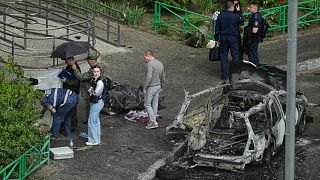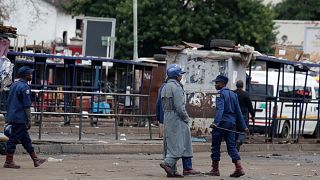Zimbabwe
Hawkers in Zimbabwe’s capital Harare remain uneasy after the government ordered illegal vendors and pirate taxis to leave Harare’s streets in 48 hours on Saturday (January 20), failure to which it will forcibly remove them with the military’s help.
A cabinet minister said the operation would be effected as the country’s new president; Emmerson Mnangagwa seeks to restore order in cities.
After leaving the streets some hawkers are back again to sell their wares arguing that its the only way to support their families.
Once prided as the “sunshine city” of the southern African nation, Harare is home to thousands of hawkers who sell everything from fruits, roasted food and clothes on pavements, which authorities say causes a health hazard.
The military, under Chiwenga’s command, in November staged a defacto coup that it dubbed “Operation Restore Legacy”, which forced former president Robert Mugabe to resign and paved the way for the rise of Mnangagwa.
“If they are failing to improve the economy maybe they should recall former resident Robert Mugabe, they have not even spent three months in office but already they are removing vendors from the streets. During 36 years of Mugabe’s rule we suffered yes but we were allowed to operate on the streets,” said Chiedza Shonhiwa, a street vendor.
About 20,000 street vendors are said to operate in the city.
The government has proposed alternative sites that registered vendors should operate from.
With the unpopular police under orders not to harass citizens, pirate taxis have taken advantage and daily flout traffic regulations and endanger other road users, authorities say.
The minister of local government, July Moyo was quoted by the official Herald newspaper saying he spoke to Vice President Constantino Chiwenga, a retired general, “to seek his assistance so that security agencies can work with the municipalities” to end the illegal activities.
Peter Chibvute a fruit vendor in the capital says the directive was not well thought out.
“They gave us an ultimatum of 48 hours to vacate the streets but we are not going anywhere, in fact we are giving them 48 hours to find us jobs so that we stop selling in the streets,” he said.
General Chimuti who sells roasted maize says his business targets pedestrians and moving from the streets leaves him with no options.
“We are very afraid of the operation and ultimatum because the word on the street is that if you are caught you will be sent to prison with no option of paying a fine so it’s going to be difficult to sell on the streets,” he said.
Under Mugabe’s 37-year rule, the rate of unemployment rose to more than 80 percent, forcing many people to eke out a living by hawking on the streets.
Zimbabwe was once one of Africa’s most promising economies but suffered decades of decline as Robert Mugabe pursued policies that included the violent seizure of white-owned commercial farms and money-printing that led to hyperinflation.
Michael Chideme is the Harare City Council spokesperson.
“We have seen some improvement, we have seen a difference, the number has greatly gone down of the informal sector and in some sections of the city where you used to see pirate taxis you don’t see them anymore because people know it was wrong, they were flouting the law, so they were just waiting for the enforcement and now the enforcement is there,” he said.
The country’s vendors union has opposed the move saying it threatens the livelihoods of many unemployed Zimbabweans.
Samuel Wadzai, is the Vendors Union secretary general.
“Forceful evictions of informal traders will not solve the current vending morass, where such eviction does not correspond to the allocation of alternative spaces in the designated sites. If anything, it will only exacerbate it, as was witnessed in central business districts of major towns and cities in 2015 where in most cases the operations like the one that is being proposed by the minister resulted in ugly and bloody scenes and even loss of life as defence of a livelihoods also entail doing everything within one’s powers,” he said.
In the midst of the rainy season, the local authority fears that illegal vending of food and fruits could lead to an outbreak of cholera.
Four people died last week from cholera in Chegutu town, 100 km (62 miles) west of Harare.











Go to video
UN intensifies patrols at displacement camps amid rising violence in South Sudan
01:12
Cholera outbreak intensifies amidst violence in the DRC
Go to video
Pics of the day: April 01, 2025
01:40
Newly elected IOC President Kirsty Coventry celebrated on return home to Zimbabwe
Go to video
Pics of the day: March 24, 2025
02:09
Electric tricycles empower women in rural Zimbabwe